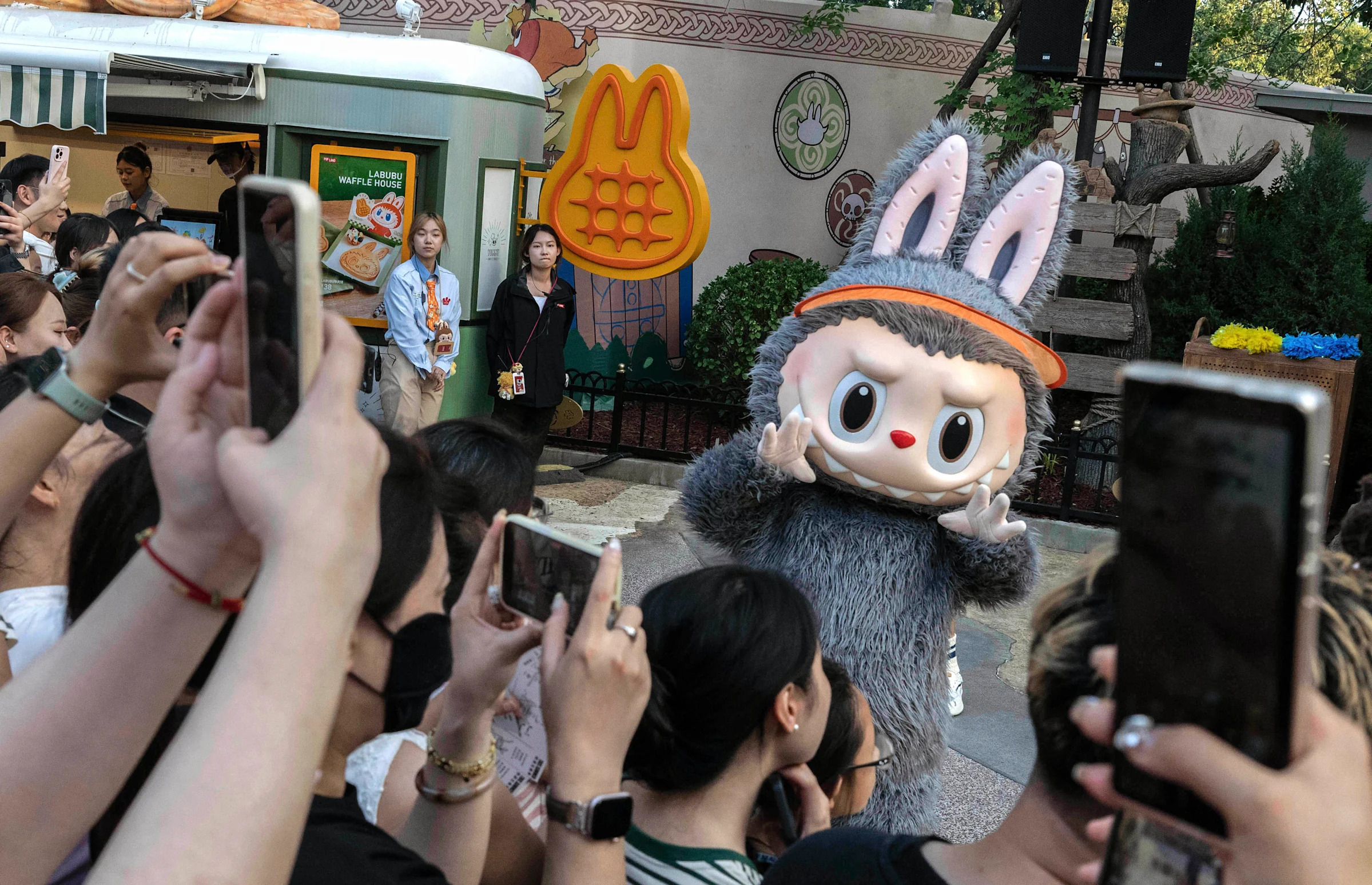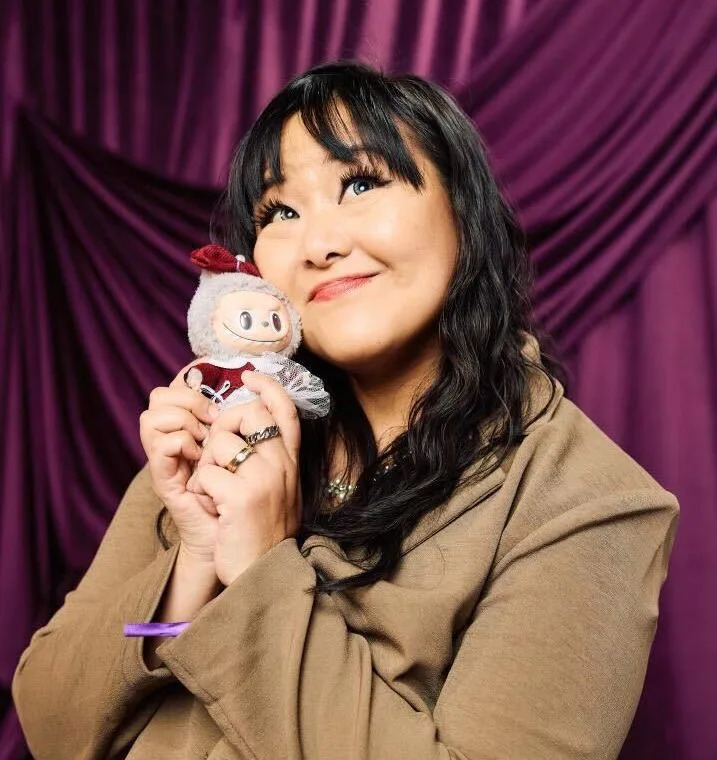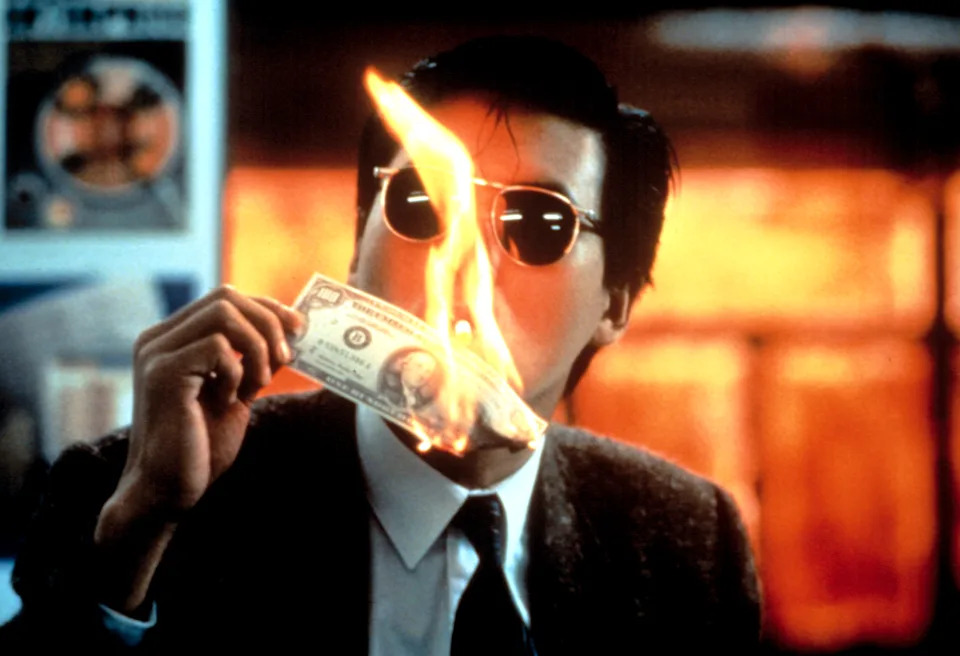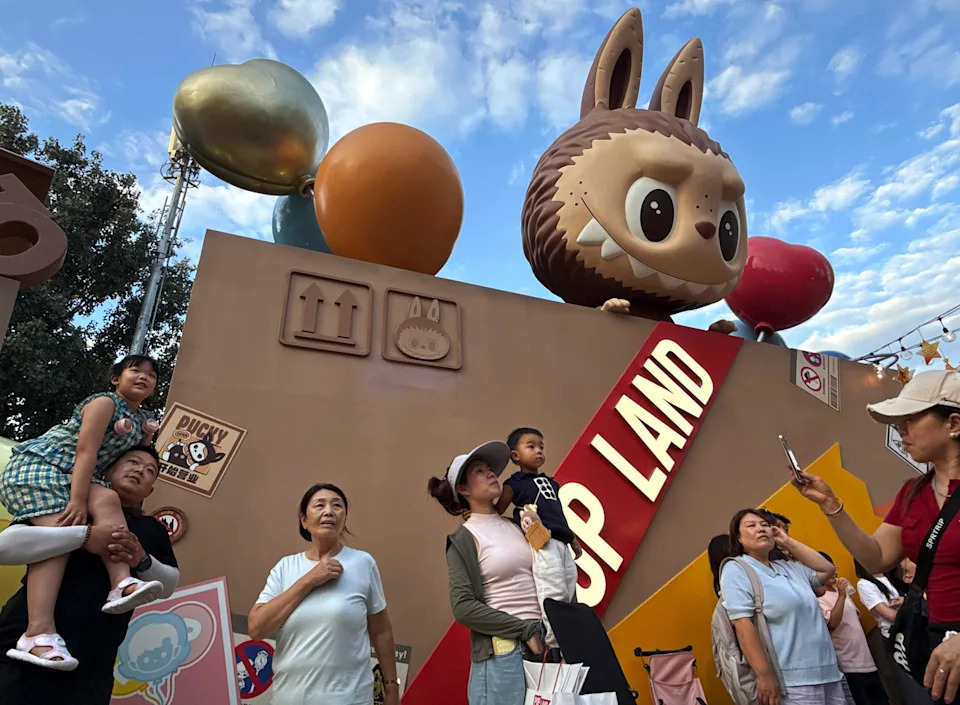China Just Started Using AI to Animate Film Adaptations — Is Labubu Next?

Picture this. It’s Thanksgiving weekend, just five months from now, and American families are already flocking to see The Labubu Movie in theaters. Made using 100 percent artificial intelligence, this (totally hypothetical) film adaptation of the mega-popular monster keychain comes from the Beijing-based retailer Pop Mart. The blockbuster was born out of China’s cutting-edge film industry in record time — putting thousands of butts in seats and raking in millions at the box office before the craze could end.
Last month, back in the real world, CEO and founder of Pop Mart Wang Ning announced his company would start an in-house film unit, per Chinese news reports. The collectibles brand saw global demand for Labubus skyrocket after a viral endorsement from K-pop star Lisa in Vanity Fair last fall. Designed by artist Kasing Lung, the baby-faced “Labubu” was partly inspired by Nordic mythology and first introduced as part of a children’s storybook by Ling that’s out of print.
More from IndieWire
'I Still Know What You Did Last Summer' Has Slasher Fans Nostalgic for... Jack Black in Dreads?
James Gunn Says It Was 'Terrible' to Tell Henry Cavill He Was No Longer Superman Amid DCU Reboot: 'It Was Really Unfair to Him'
AdvertisementAdvertisement#_R_4asadkalhb5fiv5vddbH1_ iframe AdvertisementAdvertisement#_R_8asadkalhb5fiv5vddbH1_ iframeThe hard-to-find “Monsters” stories from 2015 feature a whole cast of cute characters and several illustrated adventures starring Labubu. Now, she (yes,she) has a vibrant presence online and loose plans for a TV show. It’s in early development at Pop Mart, but there’s hope for a movie, too.
“I’m interested in knowing more about their world,” Laura Sirikul told IndieWire. A movie and TV critic in Los Angeles, she carries her Labubus everywhere, but said, “The bubble may burst by next year.”
“They’ve become so hard to get that the stock went down. Just by a bit. But people are getting tired of not being able to get them,” she said.
 Laura Sirikul with her Labubu
Laura Sirikul with her LabubuMeanwhile, the China Film Foundation recently announced an AI-driven “revitalization” project targeting 100 martial arts classics. John Woo’s “A Better Tomorrow” from 1986 will soon be recreated as an animated feature — titled “A Better Tomorrow: Cyber Frontier” — with the original movie’s visual language algorithmically reinterpreted with an illustrated sci-fi aesthetic. “Cyber Frontier” has been touted as “the world’s first full-process, AI-produced animated feature film.”
AdvertisementAdvertisement#_R_4msadkalhb5fiv5vddbH1_ iframe AdvertisementAdvertisement#_R_8msadkalhb5fiv5vddbH1_ iframeLeaders for the initiative say they aim to manufacture new demand for classic stories while paying homage to legendary filmmakers and introducing them to a younger global audience. The effort has been endorsed by the Chinese government, which continues to forward the use of AI across professional sectors.
“We sincerely invite the world’s top AI animation companies to jointly start a film revolution that subverts tradition,”Tian Ming, chairman of Shanghai Canxing Culture and Media, told the Hollywood Reporter. The Chinese production company announced its $13.9 million contribution to the revitalization effort during its unveiling at the Shanghai Film Festival, where the chairman of the China Film Foundation, Zhang Pimin, called it “a brave exploration.”
 Chow Yun-Fat in ‘A Better Tomorrow’ (1986)©Rim/Courtesy Everett Collection
Chow Yun-Fat in ‘A Better Tomorrow’ (1986)©Rim/Courtesy Everett CollectionThe martial arts project highlights the distinct approaches to AI in the U.S. and China, as outlined in a new report from the Los Angeles Times. American filmmakers are mostly hostile to the technology, citing intellectual property theft, strained labor relations, and the environmental impact of data farms — while Chinese creatives have been compelled to embrace the speed and ease of AI for innovation.
If air from the Labubu bubble is already leaking, why wouldn’t China rush to make a Labubu movie using AI?
AdvertisementAdvertisement#_R_52sadkalhb5fiv5vddbH1_ iframe AdvertisementAdvertisement#_R_92sadkalhb5fiv5vddbH1_ iframe“If there is a movie, they do need to get on it,” Sirikul said. “But if they do AI, it’s not going to bode well. If they do AI, it should only be for short-form internet content.”
Plenty of fan-made Labubu scenes have already gone viral on TikTok, where AI runs rampant. The technology has been used to render all sorts of “adaptations,” mixing characters and styles from the most popular properties to guarantee success online. The platform is also notorious for quietly disenfranchising artists, by letting people rip off their original work to feed those Frankensteins. These AI clips can be monetized if they’re popular enough, and that’s proof you could make a feature-length film.
“I create my own Labubu shorts, so I know it can be done,” Sirikul said, pointing out she doesnotuse AI. “They’re not professional, but they’re popular.”
 The Pop Land theme park in Beijing, China in July 2025Getty Images
The Pop Land theme park in Beijing, China in July 2025Getty ImagesAs directed by Grok’s cousin (or whatever), the hypothetical Labubu Movie from AI might be a trainwreck. The story could be slop. The audio might irk your brain. The visuals could be so strange that you’re forced to use your cute new Labubu popcorn bucket as emergency vomit support. Still, an AI adaptation would no doubt uncork a fountain of money. Not only would the release become a pu pu platter for new and limited-edition Pop Mart merchandise, but it would also offer a chance to experiment with the brand’s world-famous creative marketing strategy.
AdvertisementAdvertisement#_R_5gsadkalhb5fiv5vddbH1_ iframe AdvertisementAdvertisement#_R_9gsadkalhb5fiv5vddbH1_ iframeConsider the “blind box” approach that’s kept Labubu in the fast-moving American consciousness for months. Riding on the coattails of a product so popular it actually caused fist fights outside stores, marketers should have no problem convincing moviegoers to “collect” different versions of the movie. That gimmick was tried with a board game adaptation, when the 1985 film “Clue” screened alternate endings in theaters at random. The film still flopped at the box office — but maybe it wouldn’t have with the right word of mouth on social media and the cost-saving convenience of AI.
Customers have a 1 in 72 chance of getting the rare “mystery” Labubu in most collections. Use AI to generate as many different versions of The Labubu Movie, and you’ve got a social media stunt (or possibly a gambling problem) waiting to happen. These theoretical clout chasers might buy multiple tickets to see The Labubu Movie multiple times. That would be a welcome boost at the box office, but the days of telling peoplenotto film the screen would be over.
“They talk about it as agod. They talk like disciples. They’re very worshipful of this thing,” said Ari Aster in a recentinterview with Letterboxd. The filmmaker was describing the engineers who develop AI, but he could have been talking about fans of Labubu. Analyzed as a “recession indicator” online, the toy has drawn the attention of as many lifestyle brands as it has serious economists.
Getting people excited aboutanythingin 2025 is hard, and trends like Labubu could be a boon for Hollywood during tough times. Still, art lovers have never been more worried about humanity losing its way, and professionals in the industry are afraid of robots taking over.
AdvertisementAdvertisement#_R_5qsadkalhb5fiv5vddbH1_ iframe AdvertisementAdvertisement#_R_9qsadkalhb5fiv5vddbH1_ iframe“Everything is already all about IP,” said Sirikul. “Adding AI to that is killing it even more. The environment. The jobs. The creativity. It’s just negative all around.”
Hollywood was already struggling to rein in franchising when creatives went on strike in 2023 and 2024, with the creeping influence of AI among their top concerns. In 2025, American media has yet to figure out a unified strategy toward the technology, and the political divide between the U.S. and China is widening, no doubt. But whether it’s Labubu, or another trend like it, anything this explosively popular has the power to become an industry-defining olive branch — or a wedge.
It took years for Mattel and Greta Gerwig to get “Barbie” right, and Labubu is nowhere near icon status yet. But with the Hasbro Universe rapidly expanding, and “Wicked” director Jon M. Chu taking on a Hot Wheels movie next, American studios are still obsessed with toy adaptations. The success of those projects could pave the way for a traditional Labubu movie down the line.
But if companies like Pop Mart take global fads to AI instead of Hollywood, rush-shipping a product that might otherwise be worth the wait, the movie business will have a much bigger monster on its hands.
AdvertisementAdvertisement#_R_64sadkalhb5fiv5vddbH1_ iframe AdvertisementAdvertisement#_R_a4sadkalhb5fiv5vddbH1_ iframePop Mart did not respond to IndieWire’s request for comment.
Best of IndieWire
The 16 Best Slasher Movies Ever Made, from 'Candyman' to 'Psycho'
Martin Scorsese's Favorite Movies Include 'Eddington': 87 Films the Director Wants You to See
The Best Thrillers Streaming on Netflix in July, from 'Vertigo' and 'Rear Window' to 'Emily the Criminal'
Sign up for Indiewire's Newsletter. For the latest news, follow us on Facebook, Twitter, and Instagram.














